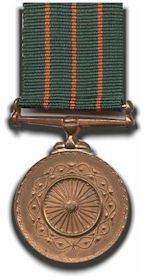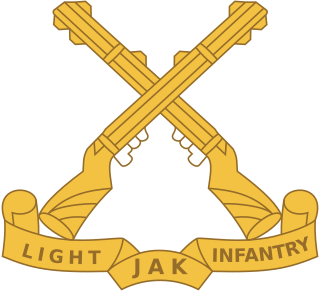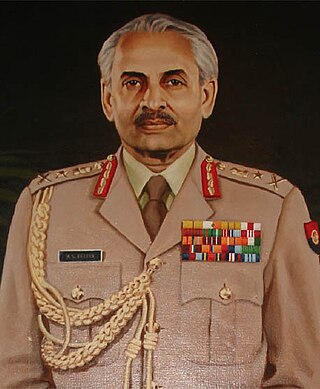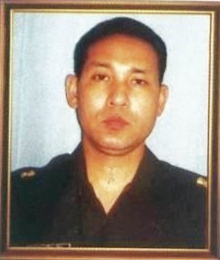
The Ashoka Chakra is India's highest peacetime military decoration awarded for valor, courageous action, or self-sacrifice away from the battlefield. It is the peacetime equivalent of the Param Vir Chakra (PVC) and is awarded for the "most conspicuous bravery or some daring or pre-eminent valour or self-sacrifice" other than in the face of the enemy. The decoration may be awarded either to military or civilian personnel.

The Sikh Regiment is an infantry regiment of the Indian Army. It is the most highly decorated regiment of the Indian Army and in 1979, the 1st battalion was the Commonwealth's most decorated battalion, with 245 pre-independence and 82 post-independence gallantry awards, when it was transformed into the 4th battalion, Mechanised Infantry Regiment. The first battalion of the regiment was officially raised just before the partial annexation of the Sikh Empire on 1 August 1846, by the British East India Company. Currently, the Sikh Regimental Centre is located in Ramgarh Cantonment, Jharkhand. The Centre was earlier located in Meerut, Uttar Pradesh.

The Shaurya Chakra is an Indian military decoration awarded for valour, courageous action or self-sacrifice while not engaged in direct action with the enemy. It may be awarded to civilians as well as military personnel, sometimes posthumously. It is third in order of precedence of peacetime gallantry awards and comes after the Ashoka Chakra and the Kirti Chakra. It precedes the Yudh Seva Medal.

The Kirti Chakra is an Indian military decoration awarded for valour, courageous action or self-sacrifice away from the field of battle. It may be awarded to civilians as well as military personnel, including posthumous awards. It is the peacetime equivalent of the Maha Vir Chakra. It is second in order of precedence of peacetime gallantry awards, comes after Ashoka Chakra and before Shaurya Chakra. Before 1967, the award was known as the Ashoka Chakra, Class II.

The Jammu and Kashmir Light Infantry is an infantry regiment of the Indian Army. The regimental center is in Srinagar's Airport Complex at Awantipora with a winter setup near Jammu. Its regimental insignia consists of a pair of crossed rifles. The regiment mostly consists of volunteers from the state of Jammu & Kashmir and ethnic groups from the state. The Jammu and Kashmir Light Infantry is considered to be one of the most decorated regiment of the Indian army having won 1 Param Veer Chakra and 3 Ashok Chakra. Naib Subedar Chuni Lal of the 8th battalion Jammu and Kashmir Light Infantry is one of the most decorated personnel of the Indian Army.

General Arunkumar Shridhar VaidyaPVSM, MVC & Bar, AVSM, ADC was an Indian Army general. He served as the 12th Chief of the Army Staff from 1983 to 1986. Following his retirement, he was assassinated by Harjinder Singh Jinda and Sukhdev Singh Sukha in August 1986, for his role in Operation Blue Star in 1984.
Ghatak Platoons are special operations capable reconnaissance platoons consisting of Shock troopers these are present in every infantry battalion of the Indian Army. Ghatak is a Sanskrit word meaning "killer" or "lethal". Their name was given to them by General Bipin Chandra Joshi. They act as shock troops and spearhead assaults ahead of the battalion.

Colonel Neelakantan Jayachandran Nair, AC, KC (popularly known as "NJ") was a highly decorated officer of the Indian Army. On 20 December 1993, while heading an advance party of the battalion, his convoy was ambushed by Naga rebels. Nair personally led the attack to break the ambush and sacrificed his life defending his men. For this act of valour, he was conferred the Ashoka Chakra.

Major Laishram Jyotin Singh, AC was an Officer in the Army Medical Corps of the Indian Army, who died fighting a suicide bomber during the attack on the Indian Embassy in Kabul. Major Singh was awarded the Ashoka Chakra, the highest peacetime gallantry award in the Indian Armed Forces on 26 January, 2011.

Colonel Vasanth Venugopal, AC was an Indian Army officer. He was the commanding officer of the 9th battalion, Maratha Light Infantry. On 31 July 2007, he was Attained veergathi in action while preventing heavily armed infiltrators from crossing the India-Pakistan border at Uri, Jammu and Kashmir. As a result he was posthumously awarded the Ashoka Chakra, India's highest military decoration for peacetime gallantry.

Lieutenant Navdeep Singh Bains, AC was a Ghatak Platoon Commander of 15 Maratha Light Infantry regiment in the Indian Army.

Major Mukund Varadarajan AC was an Indian Army officer and a recipient of the Ashoka Chakra. Mukund, a commissioned officer in the Indian Army's Rajput Regiment, was posthumously awarded the Ashok Chakra for his actions during a counterterrorism operation while on deputation to the 44th Rashtriya Rifles battalion in Jammu and Kashmir. His biographical film in Tamil, Amaran, was released on the occasion of Diwali, 31 October 2024.

Colonel Jojan Thomas, AC was an Indian military officer with the Jat Regiment and later the 45 Rashtriya Rifles unit. He was a native of Kuttoor in Thiruvalla, Kerala and lived in Bangalore. He was commissioned from the Officers Training Academy, Chennai in March 1986. On 22 August 2008, he led an operation against terrorists in the forests of Macchal sector in the Kupwara district of Jammu and Kashmir. In the process, he killed three terrorists, but sustained several gunshot wounds and succumbed to injuries. For his bravery, he was posthumously awarded the Ashoka Chakra, the highest peace time military decoration in India.

Naik Nirbhay Singh Sisodiya, AC was an Indian military Non Commissioned Officer (NCO) with the 15th Battalion of the Kumaon Regiment. For his bravery, he was posthumously awarded the Ashoka Chakra, the highest peacetime military decoration in India on 26 January 1985.

Naik Neeraj Kumar Singh, AC was a Non Commissioned Officer (NCO) in the Indian Army who was posthumously awarded the Ashok Chakra, the country’s highest peacetime military decoration on 26 January 2015. He had enlisted in the 13th battalion, Rajputana Rifles and was serving in the 57th battalion Rashtriya Rifles when he was killed in action.

Harsh Udai Singh Gaur was an Indian military officer posted as commanding officer of 10 Bihar Regiment.

Havildar Bachittar Singh, AC was a soldier in Indian Army who was posthumously awarded the highest peacetime military decoration Award "Ashoka Chakra", for conspicuous bravery, indomitable spirit and supreme sacrifice; becoming the first Indian to receive this gallantry award.

Colonel Jasbir Singh Raina, AC is a retired Indian Army officer who was awarded India's highest peacetime gallantry award Ashoka Chakra for his gallant act in Operation Blue Star.

Subedar Major and Honorary Captain Mahendra Singh, KC, SM is a decorated Indian Army Junior Commissioned Officer (JCO) of 9 Para SF. During an operation, he was paralysed on one side of his body.
Assistant Sub-inspector Babu Ram, AC (1972–2020) was a Police Officer of the Special Operations Group (SOG) Srinagar, who was awarded the highest peace time gallantry award, the Ashok Chakra.

















